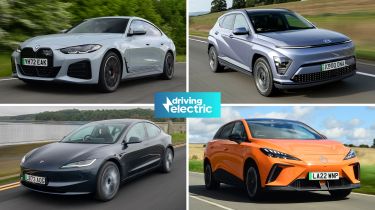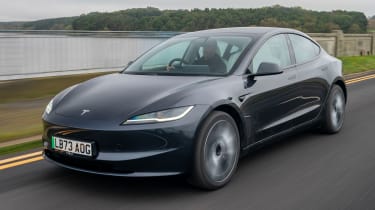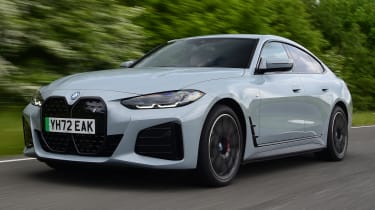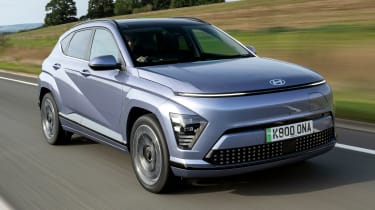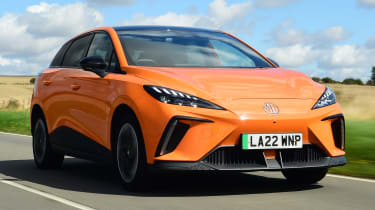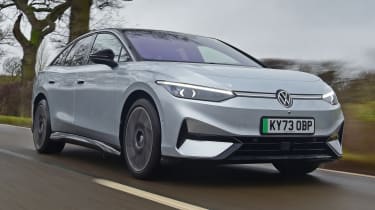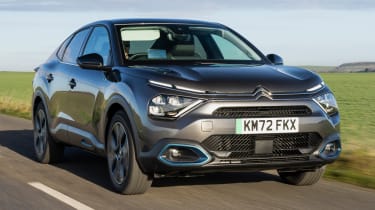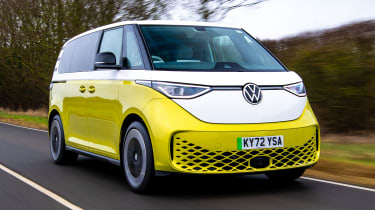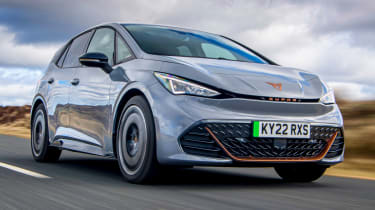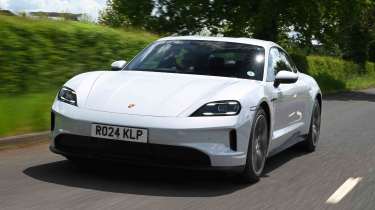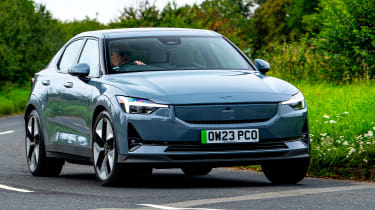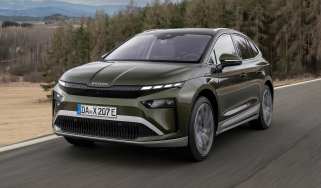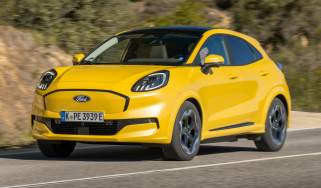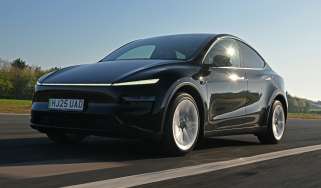Top 10 best electric company cars 2024
Choosing an electric car is a great way for company car drivers to save cash – we uncover 10 of the best
Electric company cars are swiftly becoming the primary choice for company car drivers, largely due to the substantial benefits stemming from the minimal Benefit-in-Kind (BiK) tax rates currently available for electric cars.
For a comprehensive overview, we have an in-depth explainer on Benefit-in-Kind rates, but essentially, EVs remain in the 2% BiK bracket until a potential increase in April 2025. This means that drivers switching to electric company cars are paying only a small monthly amount. To illustrate, consider the Tesla Model Y: if your income falls within the 20% tax bracket, your annual tax liability would be approximately £180, or £15 per month. For those in the 40% bracket, the annual tax rises to £359, translating to just £29.92 per month - still potentially hundreds or even thousands of pounds cheaper a year than traditional combustion-engined alternatives.
Choosing an electric company car is increasingly becoming a no-brainer, especially when considering the potential savings on running costs associated with making the switch.
Best electric company cars on sale
Read below for our list of the best electric company cars that has been carefully selected by our team of expert road testers. However, if you're not quite ready to make the switch to a full EV, take a look at our list of the best hybrid company cars.
1. Tesla Model 3
- Prices from £39,990
- Maximum WLTP combined range: 421 miles
- Benefit-in-kind rate: 2 per cent
The Tesla Model 3 is Elon Musk’s original mass-market EV and has recently received a major upgrade for 2024. A range of up to 421 miles in the Long Range variant makes the Model 3 one of the longest-range EVs you can buy. It’s the entry-level RWD model that’s perhaps the most impressive, however, as at a smidge under £40,000, it’s available to more company car drivers.
Despite its lower price tag, it still gets two huge screens – one for the front and one for the rear – full access to Tesla’s superb Supercharger network and a range of up to 344 miles. It may not sell in quite as huge numbers as its Tesla Model Y sibling, but the Model 3 is nevertheless fun, fast and full of tech. In our eyes, it’s the most well-rounded company car out there.
Read our full Tesla Model 3 review to find out more.
2. BMW i4
- Prices from £70,900
- Maximum WLTP combined range: 373 miles
- Benefit-in-kind rate: 2 per cent
The BMW 3 Series has long been the default choice for executives, and the BMW i4 intends to continue this trend into the electric age. Essentially an electrified version of the sleeker, hatchback 4 Series Gran Coupe, the BMW i4 boasts the same luxurious interior and dynamic drive as the petrol models, but with the addition of a silent yet savage electric powertrain.
Even the base BMW i4 eDrive30 model offers plenty of performance and a circa-300-mile range, though our pick is the mid-spec eDrive40 with its longer 370-odd-mile maximum. No matter which version you choose, we doubt you’ll be disappointed with BMW’s plug-in executive car, especially given it’s one of the best-handling electric cars you can buy.
Read our full BMW i4 review to find out more.
3. Hyundai Kona Electric
- Prices from £34,995
- Maximum WLTP combined range: 319 miles
- Benefit-in-kind rate: 2 per cent
One of our favourite electric SUVs, the Hyundai Kona Electric is a brilliant electric family car, and a solid choice if you’re looking for low Benefit-in-Kind bills. Available with two battery sizes, the new electric Kona is more than fit for longer journeys, with its more sophisticated suspension making motorway miles much more comfortable.
We like Hyundai's mix of hi-tech screens and ergonomic physical buttons, and its high level of standard equipment means you won’t feel shortchanged whichever model you opt for. Some might question the Kona’s strikingly modern design, but you can’t argue with the bang for buck this Hyundai SUV offers.
Read our full Hyundai Kona Electric review to find out more.
4. MG4 EV
- Prices from £26,995
- Maximum WLTP combined range: 323 miles
- Benefit-in-kind rate: 2 per cent
Not everyone’s company-car allowance stretches to £50,000 premium SUVs, and that’s where the MG4 comes in; priced at under £27,000, MG’s electric family hatchback will set your business back roughly the same as a petrol equivalent, yet it offers much lower running costs and a pretty sporty driving experience to boot.
Models range from the entry-level SE, all the way to the 323-mile Extended Range and the ultra-rapid MG4 XPower hot hatchback, which can rival supercars in terms of acceleration. The MG4’s interior may feel a bit cheap and the boot can’t quite compete with more expensive SUVs in terms of size and smart features, but the MG4 is arguably one of the most affordable electric company cars to run and proves cheap can indeed be cheerful.
Read our full MG4 review to find out more.
5. Volkswagen ID.7
- Prices from £51,550
- Maximum WLTP combined range: 436 miles
- Benefit-in-kind rate: 2 per cent
The Volkswagen Passat was, for a long time, the go-to choice for company car drivers looking for something premium and efficient, that also doesn’t break the bank. Now, the baton has been passed to the Volkswagen ID.7 for the new electric age of motoring; the entry-level ID.7 models come with a 77kWh battery pack which, with a little help from the VW’s ultra-low drag coefficient, is enough for an electric range of up to 384 miles. You can upgrade to the slightly more premium models to get a 86kWh battery, giving the driver a quoted range of up to 436 miles.
Volkswagen has righted many of its EV wrongs by giving the ID.7 a much plusher and slightly more ergonomic interior than its other ID-badged models, plus despite being far from the most powerful electric car out there, the German electric saloon is pretty good to drive, too.
Read our full Volkswagen ID.7 review to find out more.
6. Citroen e-C4 X
- Prices from £31,720
- Maximum WLTP combined range: 259 miles
- Benefit-in-kind rate: 2 per cent
Old-school saloon repmobiles like the Vauxhall Insignia and Ford Mondeo have largely been lost due to our current obsession with SUVs. However, the Citroen e-C4 X stands out as an affordable compromise between the two, providing a raised 4x4-esque stance, as well as a sleek saloon-like shape – not forgetting a fully-electric powertrain.
Citroen’s patented Hydraulic Cushion suspension and Advanced Comfort seats means the e-C4 X glides over potholes and bumps like a magic carpet, while a range of over 250 miles means you won’t be charging up too often. Plus, if you’d rather a more practical hatchback tailgate over the e-C4 X’s slinky shape, Citroen offers the e-C4 for the same price.
Read our full Citroen e-C4 X review to find out more.
7. Volkswagen ID. Buzz
- Prices from £59,035
- Maximum WLTP combined range: 292 miles
- Benefit-in-kind rate: 2 per cent
Few electric cars turn heads quite like the Volkswagen ID. Buzz. Designed as a homage to the iconic Type 2 Bus of the sixties, the ID. Buzz is just as spacious as its predecessor thanks to its electric powertrain that enables all four wheels to be pushed out into the corners of the car.
Five-seat models boast over 1,100 litres of space behind the rear bench, while the forthcoming seven-seat LWB model, as well as the commercial ID. Buzz Cargo variant, should provide even more space to carry whatever your business (or family) requires. It might not be the fastest, nor the longest-legged EV out there, but the ID. Buzz’s charm is intoxicating and if load lugging is the name of the game, few EVs can come close.
Read our full Volkswagen ID. Buzz review to find out more.
8. Cupra Born
- Prices from £35,495
- Maximum WLTP combined range: 335 miles
- Benefit-in-kind rate: 2 per cent
If you’re after an electric family car and are considering the Volkswagen ID.3, we highly recommend checking out its cut-price copper-clad cousin, the Cupra Born. Sharing many of that car’s parts, the Cupra Born boasts much bolder styling and a more involved driving experience than the VW.
We think the entry-level V1 model is the best pick of the line-up – ideal if you’ve a limited company car allowance – as it still boasts a decent range and comes utterly loaded with kit. With steering as sharp as its styling, a roomy interior and decent tech, we love Cupra’s first EV and think it makes an ideal electric alternative to the classic Volkswagen Golf or SEAT Leon.
Read our full Cupra Born review to find out more.
9. Porsche Taycan
- Prices from £87,145
- Maximum WLTP combined range: 421 miles
- Benefit-in-kind rate: 2 per cent
If you’re a company CEO looking at this list thinking that none of these options are quite luxurious, nor fast enough, let us introduce you to the ultimate company car (at a price): the Porsche Taycan. Offered as a sleek coupe-saloon or a practical estate, the Porsche Taycan is Stuttgart’s first electric car, and we think they knocked it out of the park on the first try.
While the Porsche’s plush and tech-filled interior is sure to wow anyone once they step inside – tick the right option boxes and it’s available with up to six individual screens – it’s the performance that truly sets the Taycan apart. With powertrains ranging from barmy to ballistic, the Taycan feels almost as good to drive as a 911 on the road, with sharp and engaging steering, plus tight body control. If you can afford it, electric company cars don’t get much better than this.
Read our full Porsche Taycan review to find out more.
10. Polestar 2
- Prices from £44,950
- Maximum WLTP combined range: 408 miles
- Benefit-in-kind rate: 2 per cent
Since its release, the Polestar 2 has arguably been the closest competitor to the Tesla Model 3. The Polestar closely follows Tesla not only with the Long Range model's impressive 400-plus mile range, but also with the excellent Google-powered infotainment system and the high calibre of build quality found on the car.
Despite a slightly firm ride, the Polestar 2 handles exceptionally well. It exhibits minimal body roll during cornering, providing ample grip. When accelerating out of a corner, the rear-mounted motors deliver a strong push, allowing the sportiest models to reach 0-62 mph in as little as four seconds, making it a genuinely enjoyable car to drive.
Read our full Polestar 2 review to find out more.

